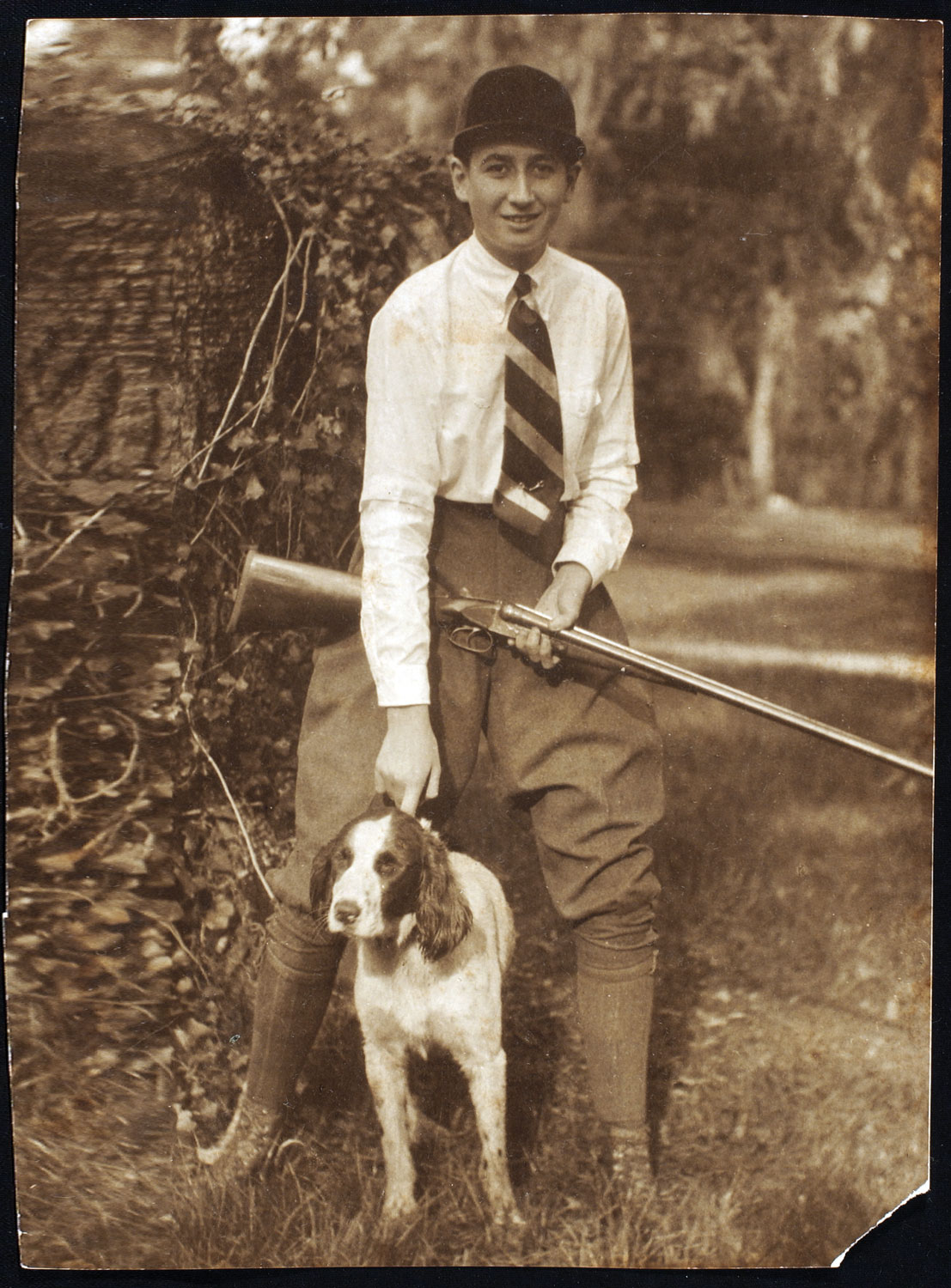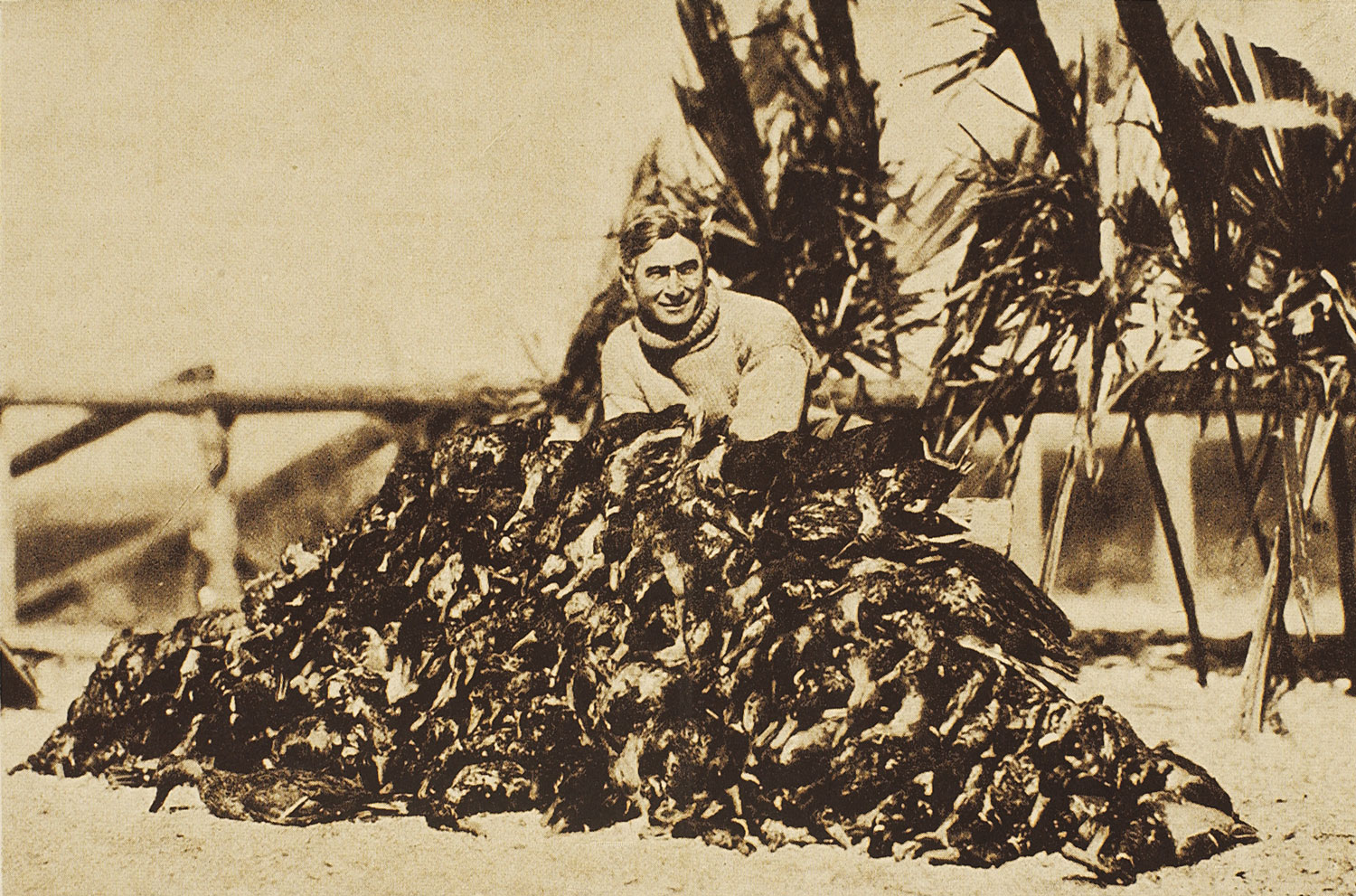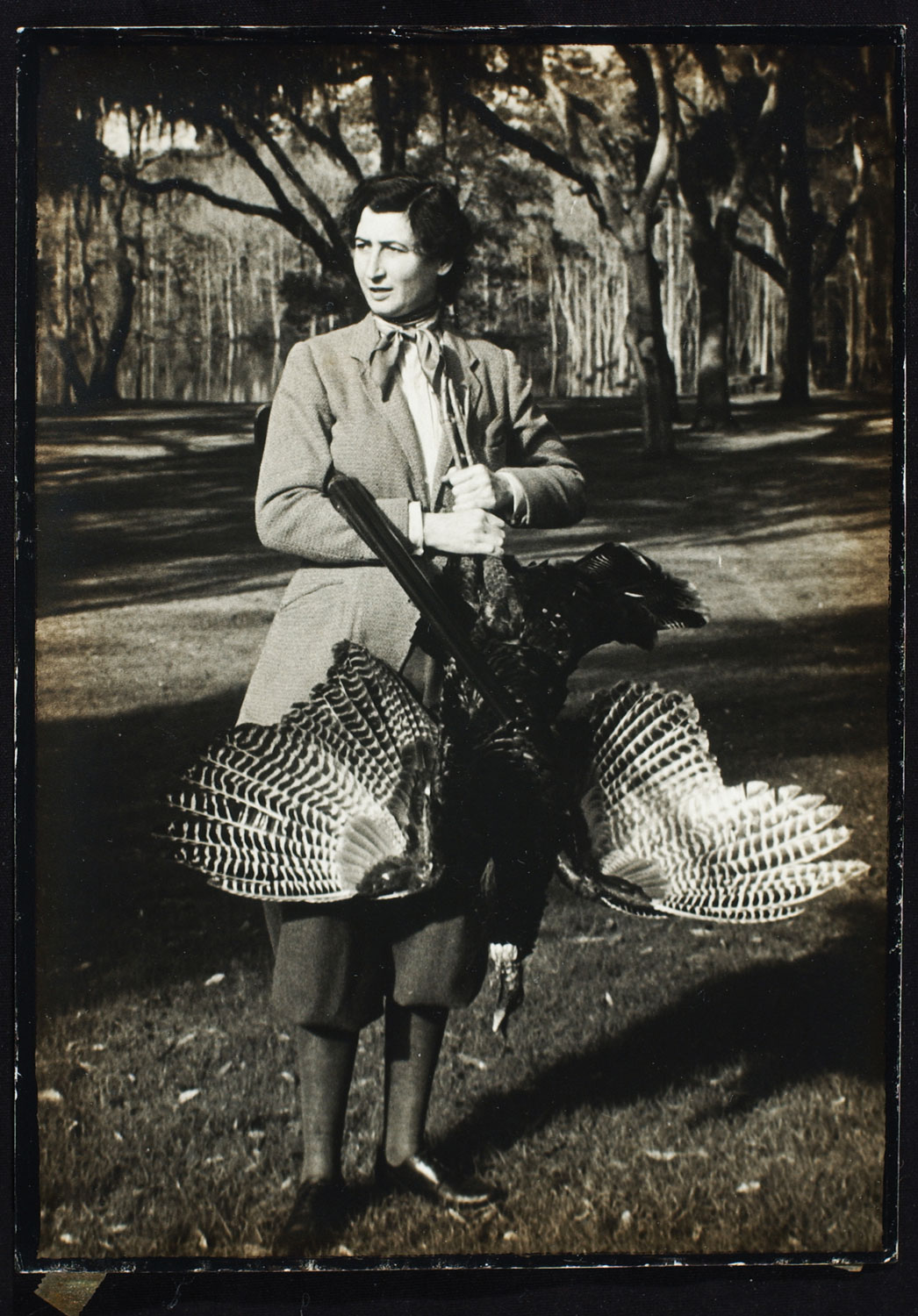She was only 13 when Big Jim Powell set her on a deer stand along a swamp road just north of Georgetown, South Carolina. Big Jim was a fourth generation waterman and they were running deer with dogs that day, an old tradition where the Santee, Pee Dee, Wacamaw and Sampit rivers spread into a marvelous delta when they meet the sea. Big Jim sat with her and coached her when a wise old buck came slipping along ahead of the hounds.
Big Jim saw the buck first. He touched her elbow, pointed and whispered, “There you go Miss Belle, take him.”
One shot and the buck dropped, a double-ought pellet through the heart.
The Georgetown Times ran the story and the New York papers picked it up. “There were forty deer jumped and eighteen shots fired which resulted in only one deer being brought down and that was killed . . . by a thirteen year old . . .”
Why so much fuss over a young girl’s first deer? Because Belle was the daughter of Bernard Baruch, internationally recognized financier and statesman.
Big Jim bloodied her face in the old tradition and Belle wept bitter tears as she watched the buck’s eyes glaze in death. Though she would go on to shoot ducks, quail, turkeys, wild hogs, alligators and even driven grouse in Scotland and Eastern Europe over the next half-century, she would never hunt deer again.

The eldest of three children, Belle sprung from colorful stock, way back to Baruch the Scribe, secretary to the Old Testament Prophet Jeremiah. Her grandfather, Simon Baruch, emigrated from Prussia to Camden, South Carolina, in 1855, where he kept books for a general store. Simon showed promise beyond a bookkeeper and was admitted to the Medical College in Charleston. After graduating from surgeon’s training in Richmond, Virginia, in 1862, he joined the Confederate Army and was assigned as the personal physician for Robert E Lee. Twice captured and twice paroled, Simon fought to the last.
Fleeing the wartime devastation left by General Sherman in South Carolina, Simon Baruch resettled in New York City where he became a pioneer in physical rehabilitation. Unreconstructed Rebel to the end, he would stand up in crowded New York theaters and raise a piercing rebel yell if he even thought he heard a few notes from “Dixie.”
Belle’s daddy was the fabulously wealthy Bernard Baruch, “the Wolf of Wall Street,” who made a killing in the Cuban sugar trade. Lifelong Democrat and advisor to seven presidents, Baruch was widely judged to be the single most influential man in America, though he never held elected office. Famous for his sessions on a park bench across from the White House, Baruch would hold court with vagrants, generals, professors, brokers, bankers, criminals and congressmen. Complaints, plans, ideas, theories, dreams or crackpot fantasies, if it caught Bernard Baruch’s fancy, you could be certain the President would hear about it too.
Bernard Baruch came back to his native South Carolina to hunt ducks near Georgetown in 1904 on Friendfield Plantation. The plantations of Georgetown County previously produced 80 percent of America’s rice, but war and back-to-back hurricanes ruined the ricefields. By the time the fields were ready to plant again, rice production was becoming mechanized, and the local pungo muck would not support tractors, gargantuan steam and diesel iron-wheeled contraptions in those days. So rice production shifted to Louisiana, Texas and Arkansas, and the former fertile ricefields of the Georgetown District were managed for waterfowl.

This postcard, circa 1910, shows Bernard Baruch on a 100-duck day.
The shooting was excellent before Federal protection, up to 100 ducks from one blind on a good day. Baruch, a lifelong wingshooter, coveted Friendfield. But a man of his means and ego wanted more. Friendfield was once part of a royal land grant called Hobcaw Barony, Indian for “land between the waters,” gifted by King George I to one of his cronies. The barony was later subdivided into 11 plantations, and Baruch dreamed of owning them all and establishing himself as “The Baron of Hobcaw.”
It was a curious situation. After being ruined by the Yankees during the Civil War, plantations were snapped up by Yankee industrialists for winter homes and hunting retreats at pennies on the dollar. A man with money could slide in and be a king. Henry Ford, Cornelius Vanderbilt, Andrew Carnegie, Joseph Pulitzer, assorted Guggenheims – they all came. So complete was the takeover, by the 1920s hardly a plantation on the coast of South Carolina or Georgia still belonged to a local family. Most blacks still lived on the old plantations as in slave times, happy to get new work as dog handlers, domestic servants, horse grooms and hunting guides for 50 cents a day.
Bernard Baruch eventually purchased most of the original Hobcaw Barony, 17,500 acres, for a pittance – an average of $3.15 an acre, fair market price, he reckoned.
To Belle Baruch, Hobcaw was heaven – “the friendliest woods in the world,” she later remembered. This was, of course, considerable exaggeration, considering the rattlesnakes, moccasins, copperheads, alligators, wild boar, bears and the occasional panther, not to mention the ticks, biting flies, chiggers and 56 species of mosquitoes.
Typically, the family quit New York and Washington at the end of “bug season,” just before Thanksgiving, traveling by rail to the whistle-stop town of Lane, South Carolina. Then it was by wagon and later by motorcar to Georgetown, where they boarded a launch to Hobcaw. Home was a rambling 1890 pine house, which the children cheerfully dubbed, the Old Relick. With a fireplace big enough for eight-foot logs, the house sat on a bluff overlooking Winyah Bay.
There is nothing so good for the inside of a girl, somebody once noted, as the outside of a horse. And never was it truer than with Belle. She had ridden and driven ponies since she was a child, but came to serious horsemanship by way of her daddy’s fox hunts. Family and friends would typically gather at the Old Relick for supper and then retire to the porch as the dogmen beat the bushes with their hounds. Horses were saddled and ready and when the hounds struck, the party swung onto their saddles and rushed pell-mell through the darkened woods. Though they seldom caught a fox, they had fine times trying.
By the time Belle was 16, she was pushing 6 feet, and as her biographer Mary Miller noted, “could outride, outshoot, outhunt, and out sail most of the young men of her acquaintance, not the most desirable attributes for a young lady in the polite society of 1918.”
But it did not matter. Belle had inherited not only her daddy’s height and charisma, but his determination and his fierce sense of competition. She was continuously at odds with her little brother, Bernard Jr. But her prissy younger sister Renee, who preferred dolls and make-believe tea parties, did not trouble her at all.
Had Belle been a man, she would have joined the Army in WWI, but instead she volunteered as a radio technician, first learning and then teaching Morse code to men in the U.S. Signal Corps. Meanwhile, her father’s connections introduced her to some of the most influential people of her day, President and Mrs. Woodrow Wilson, Winston Churchill, “Blackjack” Pershing, General George Marshall and a young major, Dwight Eisenhower.
Faced with the reality of the new income tax, Bernard Baruch decided to endow each of his children when they reached their majority. When she received her million dollars – a huge sum in those days – on her 21st birthday, Belle distressed the family by moving to France and spending her money on horses.
Meanwhile, three entirely separate events conspired to change both Belle’s life and the future of Hobcaw. On December 29, 1929, the Old Relick caught fire when the house was full of duck hunters just sitting down for supper. When it was obvious the house could not be saved, family and friends rushed about, grabbing whatever they could carry out onto the lawn. Junior managed to snag his prized Victrola and a stack of records. Baruch and his friends braved the flames one last time to roll a barrel of whiskey out of the cellar. The assemblage tapped the barrel, settled into the salvaged furniture and watched the flames.
“Play us a song, Junior,” Baruch said. In the dark, Junior reached for the first record he could find. “I don’t want to set the world on fire,” the machine crooned, “I just want to start a flame in your heart.”
Bernard Baruch would replace the Old Relick with a massive three-story brick home. Though The Hobcaw House would host Franklin and Eleanor Roosevelt, among other luminaries, things would never quite be the same for the children.
Belle rode the European horse show circuit astride Souriant, a tall Anglo-Arab. At the end of each season, she came back to New York for the movies and Broadway plays. Junior, meanwhile, had gone off to England and gotten married. Jubilant upon his return to the States, he and his bride walked unannounced into Belle’s apartment in the city, only to find her deep in passionate embrace – with a woman! Junior’s mortification turned to an anger that never healed. Years later, Junior would have no part of Hobcaw if it included Belle. And the future of Hobcaw would be forever linked to his troublesome sister.
Finally, in 1935 both the Atlantic Intracoastal Waterway and U.S. Highway 17 were completed, opening up the Lowcountry to recreational boat traffic and tourists motoring from Yankeeland to the Florida beaches. With tourists came a rush of residential and commercial development that continues to this day. As writer and Myrtle Beach native Bo Bryan succinctly noted, “It was like a carnival set up in a turpentine camp and never left.” A 50-mile stretch of coastline suddenly became a neon honky-tonk, and the wilds of Hobcaw Barony were suddenly more precious than ever.
Europe in the 1930s was a dangerous place for a Jew. Though Belle was baptized and raised Episcopal, her father was likely the most famous Jew in the world. Baruch was not particularly devout, but that did not seem to matter. After Belle and Souriant whipped the German cavalry in competition, the German officers conspired among themselves.
“How can a female Jew do such a thing?”
“It must be the horse, my colonel.”
“Well then, let us buy the horse. She would not refuse if we said it was a birthday gift for der Fuehrer.”
Wrong!
Ditto for the Italian cavalry a few years later.
And then Belle fell in love, this time with a man!
He was Charles Davila, the Romanian ambassador to the United States, setting hearts a-flitter coast to coast. He had impeccable European manners and was nephew to composer Franz List. He had a washboard of medals down his chest. Belle and Charles made a happy couple, sharing a love of music, dance and horses. They celebrated their engagement by shooting driven grouse in Scotland. But Daddy was outraged. “Marry a foreigner? I’ll give you a million dollars to forget the whole thing!”
Another million?
Belle, as you might expect, politely told her daddy “No” and in a huff, returned to Europe.
But King Carol II of Romania made the most compelling case against the nuptials. If the Romanian diplomat persisted on marrying the daughter of the World’s Most Famous Jew, Romanian fascists would assassinate them both. Though Belle and Charles called off the marriage, the couple remained close for the next 20-odd years. And Charles pined, single for the rest of his life. Belle, of course, claimed the idea as her own, took that second million from her father and doubled the size of her French stables.
Aside from being a financial wizard, Bernard Baruch was a keen student of history and an astute observer of current events and international politics. He could see war coming, and he began plotting to lure Belle home from Europe. Previous experience taught him bullying or bribing would not work, so instead he offered her the most precious thing he owned. He would subdivide Hobcaw and offer her a generous slice of it. Once again, he knew better than to make it a gift, but he might – he hinted – be persuaded to sell it to her at market price.
Belle took the bait and came home. She even got her horses out of France before the German invasion. She built stables and a comfortable home overlooking Winyah Bay, appropriately naming it Bellefield, and took up hunting full time, especially the wild hogs that were threatening to overrun the place. But once America entered the war against Germany, there was no peace on Hobcaw Barony.
Even the best rider will fall on occasion, and over the years Belle had her share of horse-wrecks. She was barely 30 but arthritis was already setting in. When competitive riding events shut down during the war, Belle found a new interest – flying. She bought a sporty little Stinson single engine and a larger twin-engine Beechcraft, but to her dismay, both planes were confiscated by the government for use in coastal patrol. German submarines were prowling just offshore and torpedoing Allied ships within sight of land. It was rumored they were communicating with Nazi sympathizers ashore and even landing spies and saboteurs on the beaches with rubber boats. The government took away her planes, but gave her a revolver and a flashlight and set her to patrolling Hobcaw’s beach. Radios were in short supply, so whenever Belle saw something, she had to drive all the way to Georgetown and report in person.
And she saw plenty.
Debris from a torpedoed ship, strange lights flashing unknown codes, footprints from persons unknown coming up the sand beaches. Her reports of suspicious activity resulted in three arrests, and she was asked to report directly to Naval Intelligence and J. Edgar Hoover of the FBI. Clearly, the Nazis were watching the World’s Most Famous Jew.
In 1943 the Coast Guard took over the beach watch, with the famed “Pony Patrol” of machinegun-toting mounted swabbies. Reasons for such intense scrutiny became apparent in 1944, when President Roosevelt spent a month on Hobcaw, running the war from an upstairs bedroom in the big house in a vain attempt to recover his health. By then, Belle had learned to cherish her privacy. She refused to speak of any conversations with government higher-ups, referring to her service during the war as “volunteer beach patrol.”

Belle Baruch killed this gobbler in the late 1930s at Hobcaw Barony in South Carolina.
By 1946 Belle was back hunting ducks, turkeys and wild hogs, and buzzing poachers with her newly returned aircraft, which she was delighted to find in perfect condition.
Bernard Baruch predicted a Republican victory in 1948, one of the few times he turned up dead wrong. The prediction did not endear him to President Harry Truman, and for the first time in nearly 50 years Baruch did not have free run of the White House. He was past 70 now and the romance of a soggy duck blind at 5 a.m. was wearing thin. He was writing his memoirs and shooting a few quail near Kingstree, South Carolina, on a farm he called, “Little Hobcaw.”
In 1956, considering an eventual distribution of his assets, he deeded the remainder of Hobcaw to the only person who loved it as much as he did, his daughter Belle, the troublesome child.
But what could a person do with such a thing? On its 17,500 acres were two monumental houses, innumerable outbuildings, many of great historical importance, 20 miles of rice dikes, 96 miles of roads, 14 bridges – all within ten distinct ecosystems.
Belle went pig hunting in the winter of 1963, a hired man perched on the fender of the jeep with a rifle. She barked and cussed and almost wiped him off against a swampland hickory. Later, when she went to balance her checkbook, all the numbers slanted off in the same direction as the hickory. Belle was dying of cancer. Her doctors knew it, but would not disclose the bad news, lest she walk out in the woods alone and blow out her brains.
In one final act of love, Belle Baruch took care of Hobcaw Barony before her death. She had no children; neither did Junior or sister Renee. Remembering her days in these woods as a child, she dedicated all of it to the children of the world by setting up a foundation to support Hobcaw in perpetuity, a fund now worth nearly $15 million. Today, both Clemson University and the University of South Carolina maintain research facilities on Hobcaw. There is a museum, an interpretive center, laboratories, dormitories for students, cabins for instructors.
“Belle Baruch created a unique gift to conservation in 1964,” says senior Hobcaw interpreter Lee G. Brockington. “She was one of the very first in South Carolina to dedicate land to future research and education, while being privately maintained by a foundation. Other plantations had been donated to state or federal governments or become public parks or private gardens. We think Hobcaw Barony was one of the first gifts linked to university-level research. Students from all over the world come to Hobcaw.”
And a hunter can still sign up for a stand, so long as he or she sticks with it long enough to kill a wild hog. But don’t you ever shoot a deer.
Belle would expect no less.

